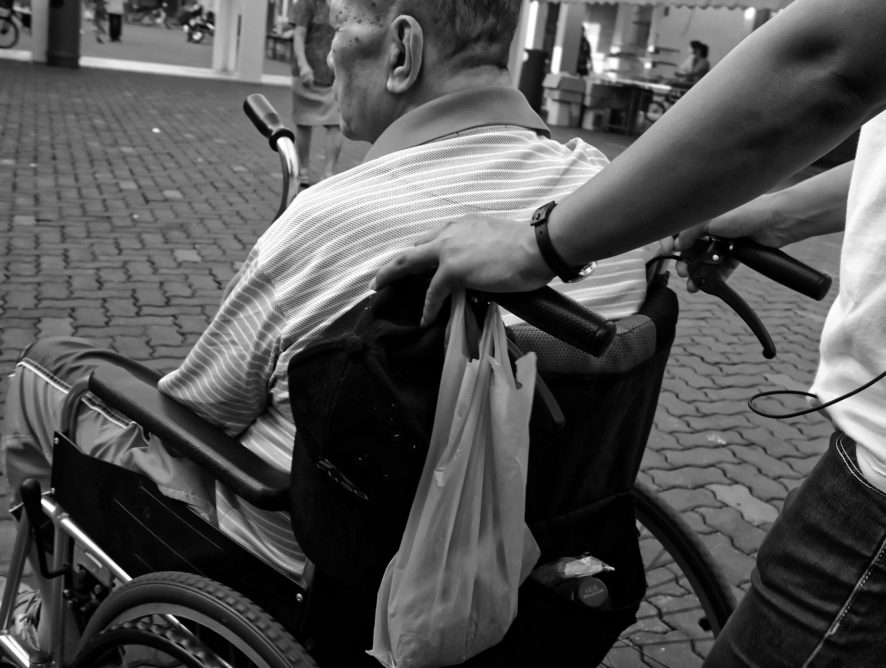A guest post by Dr Natasha Yates
The student stood, tears in her eyes, and ran out of the room. All eyes turned to me, the lecturer, to see what I would do. I was not standing at the front of the class, but was seated among them. The person up the front was another student. He looked pained. Not because his colleague had just left the room during his presentation, but because what he was talking about was causing him genuine distress as well.
We were partway through a debriefing session on the subject of Carers. Each student had been tasked with the job of visiting a Carer in their home in the preceding few weeks, to simply hear their story. They were to try to listen – and truly hear – what life is like for a Carer in our community. This was a key part of our General Practice teaching curriculum, and we had decided to approach teaching Carer issues through the power of narrative and not dot points. We wanted our students, who were in their final year of study, to put faces and stories to what we were talking about. We hoped that this would drive the messages home in a memorable and powerful way.
For example, to tell students that Carers struggle with guilt is true. However for a student to sit with a Carer who is overwhelmed with guilt because yesterday they lost their temper with the one for whom they care, is a different learning experience. When they hear that the Carer has not had a full night of sleep in months, is unable to leave the house for longer than an hour at a time, and that the one for whom they care used to be their beloved husband… then, suddenly and impactfully, the concept of guilt is not just a word on the page. It is complicated, and painful, and not easily “fixed”.
Students returned to the University into the safe setting of a lecture theatre, and recounted to their peers the stories they had heard. We deliberately asked them to avoid talking about their Carers as if this was a “patient handover”. We wanted to remove the option of escaping via clinical detachment. We wanted them to stay connected to their emotions. That they took up this challenge and shared so beautifully was inspiring to us as teachers.
Several times a student felt the need to leave the room during a debriefing session; but while the mood was generally sombre it was not so much depressed as respectfully serious. As we heard story after story we developed a clearer understanding of what life for a Carer was like; and there were always stories in which we identified ourselves, or our family members – “there, but for the grace of God, go I”.
Within these relatable stories lay the greatest power to teach and to learn.
There were often times of laughter as well, and we would admire the incredible resilience in both the Carers and the cared-for.
As educators, we knew that what we were doing was having a profound effect on the students. (Not all of them of course – for a variety of reasons there were always some students in each class who did not participate fully). As part of our analysis of our curriculum we decided to study what was happening with the students’ empathy during the Carer interview process.
While the findings are yet to be published, the gist of what we discovered was this: students who had high levels of “active coping” were able to maintain their empathy despite being confronted with the challenging truths they were learning. Active coping meant agreeing with statements like “I get help and advice from other people”, “I get emotional support from others” and “I express my negative feelings”.
This was encouraging, as much literature points to the steady decline in student empathy as they hit the clinical years of their training. However, students who had low levels of “active coping” (ie disagreeing with the above statements) showed a measurable reduction in their empathy. In other words, some students were challenged to the point where their empathy was being drained, so they were pulling back from “feeling with” their patients – which is the opposite of what we were hoping would happen.
As I read more about empathy, I found that it is something that can be taught, and I wondered whether it was worth teaching it in conjunction with the Carer interviews.
But I also wondered what teaching empathy actually meant at a deeper level for the individual learners: it seemed that you could teach people techniques that would make them score higher on empathy rating score sheets. But was this actually changing them as people? Was it making them truly more empathic, or just making them appear more empathic? When Professor Ian Hart addressed Ottawa 2016 he said “Students don’t learn what you EXPECT, they learn what you INSPECT”. The ripple of laughter from the audience confirmed that he had described a well-recognised educational truth. If students know you want them to act empathically, and know they are going to be rated on this, they will be able to give the appearance of empathy. But does this make them more empathic? I am yet to see evidence that reassures me that teaching empathy (in isolation) is not going to simply be teaching students to play a role.
We continue to teach students the Carer interview via narrative. We have made some modifications, but we believe it is a powerful format for educating about this important topic. In the limited time we have to teach, we find we are able to cover the key messages very clearly and effectively. For the students’ part, they are all extremely grateful that we have placed the Carer interview in our curriculum.
The student who had run out the room at the start of this story returned a few minutes later. When her turn came to speak she asked permission to share the story of her own family*. She was the eldest child of three, and one of her younger siblings had a profound disability. Her humble description of what her family went through to care for her sibling was an unforgettable lesson for all of us. She was one of a number of students whom I have taught over the years who know exactly what it is like to be a Carer – because that is a core part of their own life story.
I would love to know if and how other medical educators are intentionally attempting to teach empathy, compassion, or coping. In future blogs I will explore the difference between empathy and compassion, and how wrestling with this has helped me develop a clearer understanding of how to both teach and practice in heart-wrenching situations.
*details have been changed to protect student’s identity

Natasha Yates is an experienced General Practitioner and Medical Educator on the Gold Coast, Australia. She has a particular interest in helping students develop compassion, resilience and the habits of reflective practice. This blog is her space to write about the more interesting (and sometimes esoteric!) things over which she mulls, some directly related to teaching but some simply and potentially impacting the way she grows and changes. She a wife and mother of four primary aged children and enjoys good coffee –
although with four children, some days any coffee will do!
You can follow her on @DrTashY or contact her via this website.

